How Skipping Fiber at Breakfast May Negatively Impact Your Health
A vital aspect of maintaining a healthy lifestyle is to follow a well-rounded diet. Experts worldwide emphasize the significance of integrating crucial nutrients into every meal, starting from breakfast. Despite its numerous benefits, fiber is often neglected in our morning meal choices, causing us to miss out on its health advantages. Is fiber truly essential for our breakfast meals? Let’s explore what the specialist has to say about this topic.
Fiber For Breakfast: Beneficial Or Detrimental?
As per nutritionist Shalini Sudhakar, breakfast is commonly regarded as the most crucial meal of the day and should consist of all vital nutrients, with fiber playing a pivotal role. Omitting fiber at breakfast can result in various health issues such as accelerated aging, digestive complications, and insufficient detoxification. Fiber is crucial for maintaining a healthy gut, stabilizing blood sugar levels, and aiding in the detoxification process. Without it, your digestive system may become disrupted, leading to discomfort and prolonged issues.
How To Incorporate Fiber Into Your Breakfast?
If you are pressed for time in the mornings, nutritionist Shalini Sudhakar suggests a straightforward yet effective solution: consume one tablespoon of chia seeds soaked in water alongside your regular breakfast. This small yet nutrient-dense ingredient will supply you with three to five grams of fiber, equivalent to a full bowl of vegetables. Chia seeds are not only abundant in fiber but also essential nutrients, making them an excellent choice to enhance your fiber intake.
Easy Pointers To Enhance Your Fiber Consumption
Our bodies cannot digest fibers, so they pass through the small intestine into the colon, aiding in maintaining our bowel health. Additionally, dietary fiber augments the weight and size of our stool while softening it, ensuring the functionality of our digestive system. If you are seeking methods to include more fiber in your diet, consider the following suggestions:
1. Grains: Opt for whole grains like brown rice, quinoa, whole wheat pasta, and oatmeal, which are teeming with fiber, keeping you satiated for longer and averting digestive issues.
2. Fruits And Vegetables: Increase your fiber intake by incorporating a variety of fruits and vegetables into your meals, such as apples, oranges, berries, carrots, leafy greens, and broccoli, as they are particularly rich in fiber.
3. Nuts And Seeds: Instead of indulging in processed snacks, munch on nuts and seeds when hunger strikes between meals. These wholesome snacks are not only rich in healthy fats but also protein and fiber, keeping you full and satisfied.
4. Legumes: Incorporate legumes, lentils, and dal into your diet, as they are brimming with dietary fibers that are gentle on the stomach. They can be added to soups, salads, gravies, or tasty treats like veggie burgers and tacos.

